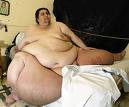
New York: Slightly overweight people live longer than those of a “healthy” weight, according to new research.
The researchers in the US and Canada concluded that a person’s weight was not the full picture in good health. It is better to be plumpish and exercise than to be slim and sedentary, the study found
For instance, a stressed-out, sedentary person of normal weight may be in worse shape than a plumpish individual who exercises and keeps stress levels under control.
The researchers tracked the health and habits of more than 11,000 Canadians for 12 years.
The men and women were divided into five categories based on their Body Mass Index, calculated by dividing their weight in kilograms by their height in metres squared.
Using pounds and ounces, the weight in pounds is multiplied by 703 and divided by the height in inches squared.
This means that a 5ft 10in man weighing 11st 2lb would have a BMI of 22.3, placing him within the ‘normal’ weight range.
A rating below 18.5 is regarded as underweight, above 25 is overweight and above 30 regarded as obese.
Those with a BMI of above 35 were classed as extremely obese.
During the period studied, the underweight were 70 per cent more likely to have died than those of normal weight, followed by the extremely obese. However, the obese lived roughly as long as those of normal weight.
Those classed as overweight, meaning they were carrying a stone or so too much for their height, were 17 per cent less likely to have died, the journal Obesity reports.
Researcher David Feeny, of Kaiser Permanente Northwest Centre for Health Research in Oregon, said: ‘It’s not surprising that extreme underweight and extreme obesity increase the risk of dying but it is surprising that carrying a little extra weight may give people a longevity advantage.’
Dr Feeny, who falls into the overweight category, said there could be several explanations for the result.
For instance, concern about the health of the overweight and obese may mean that problems such as high blood pressure and diabetes are more likely to be spotted and treated, improving health.
And those who start out slightly heavier will have more reserves to call on should they lose weight due to ill health as they get older.
Finally, a person’s lifestyle has to be factored in.














